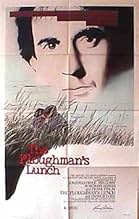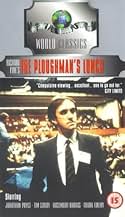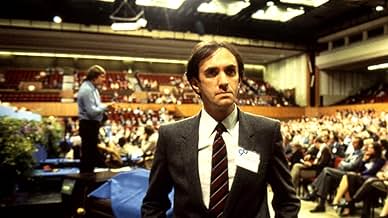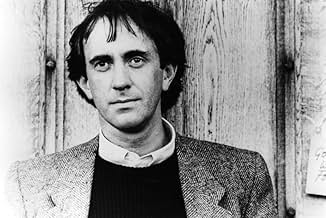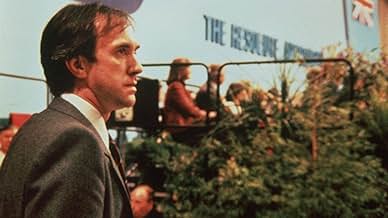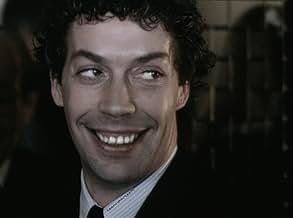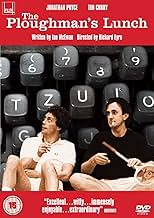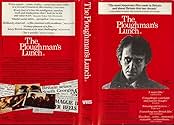Agrega una trama en tu idiomaJames Penfield (Jonathan Pryce) has made a career out of journalism. Now bankrupt, he finds himself with a group of other writers in the middle of the dispute-ridden British homeland at the ... Leer todoJames Penfield (Jonathan Pryce) has made a career out of journalism. Now bankrupt, he finds himself with a group of other writers in the middle of the dispute-ridden British homeland at the time of the Falklands War.James Penfield (Jonathan Pryce) has made a career out of journalism. Now bankrupt, he finds himself with a group of other writers in the middle of the dispute-ridden British homeland at the time of the Falklands War.
- Dirección
- Guionista
- Elenco
- Nominada a1 premio BAFTA
- 1 premio ganado y 1 nominación en total
Robert Cartland
- Editor
- (as Bob Cartland)
- Dirección
- Guionista
- Todo el elenco y el equipo
- Producción, taquilla y más en IMDbPro
Opiniones destacadas
This is a very cold, well observed multi-layered portrait of a bunch of vile people, all scrambling up and down the greasy pole in the politically bleak bourgeois homeland of Thatcher's Britain at the time of its Falklands War obsession. The central character, an empty, ambitious, morally bankrupt journalist (Jonathan Pryce) is impossible to like or even dislike - just like the film itself. It's like a doctor's accurate diagnosis: you may need to know, but you don't necessarily want to. The photography is beautiful.
That's my question! Rosemary Harris who has appeared on stage, films, and television with great respect, accolades and honors still hasn't received Damehood yet like Judi Dench, Maggie Smith, and yet she is as good and even sometimes better than her contemporary British counterparts. It's one of the reasons I picked up this little film at the drugstore for five dollars. Jonathan Pryce still hasn't been honored yet but I'm sure he will. I could Rosemary Harris in anything. I'm glad that people are recognizing her more since she played the Aunt in Superman but still it's not enough. Rosemary Harris plays Ann, a mature older woman, who has her sights set on Pryce's James Penfield, a troubled journalist. The film is set in the 1980s during the peak of Margaret Thatcher's term as the country's prime minister. I was pleased to see parts of London like Brixton, Brighton, and Norfolk actually be used as locations rather than just saying they were there. The plot is thin but I think Rosemary's BAFTA nominated performance makes up for it anyway. She's still heartbreaking and brilliant.
Spectacular balancing act between fact and fiction, public and private, greedy, ambitious Thatcherites and vacuous upper class specimen of the gauche caviar. The "Ploughman's lunch" is extremely tightly narrated and manages to make the spectator interested in the sorts of a bunch of not really likeable characters and their struggles for love, sex and power.
This is "Wall Street" in European and ultra-minor key version and a formidable depiction of the Eighties and their political and social contradictions.
Hope I haven't made it sound boring, because it isn't -- it's wryly, dryly funny, without even so much of a wink to the spectator, and dissects his protagonists with surgical precision.
Hope I haven't made it sound boring, because it isn't -- it's wryly, dryly funny, without even so much of a wink to the spectator, and dissects his protagonists with surgical precision.
The Ploughman's Lunch is a very interesting movie. It is rather slow sometimes, and some of the lost interest ideas could have been a little better developed. But if you do stay with it, it is a fine movie. The movie is very well made, with stylish camera shots without being too fancy and fine location shooting. The direction is very skilled while never flashy, the story is compelling with a superbly staged and written scene in the pub between Jonathan Pryce and Frank Finlay and the writing is superb. The characters are even more fascinating, especially Pryce's. Ghastly but deliberately so. The acting especially from Pryce and Rosemary Harris is uniformly excellent. Overall, a fine and interesting film, that is worth sticking with even with the pace. 8/10 Bethany Cox
I am a huge fan of Richard Eyre's work on stage and think he did a masterful job running the National Theatre for all those years. However, both the movies he has directed that I have seen (this one and Iris) are flawed. I think his style of directing might not suit film. There are several passages of the film that neither progress argument, nor develop characters nor set atmosphere effectively.
I am also a big fan of Ian McEwan's writing. This story is full of interesting material. Some of it could come across better - especially the double crossing in the various love interests and the echo of the Suez crisis therein. This might come down to the screenplay or perhaps the directing again.
But stick with it.
The scene in the pub during which Frank Finlay explains to Jonathan Pryce the origins of the ploughman's lunch is superb. The ghastly hermetically sealed cheese chunks on their plates providing a visual to Finlay's words.
We live in a society where we constantly reinvent the past in our attempts to shape the future as we want it. This is a key lesson in the film on all its many levels - the several love interests, Pryce's dereliction of family duty, the Falklands War and the Suez Crisis.
This is a fascinating piece. All the characters are ghastly, especially Jonathan Pryce's well-crafted central character. The standard of acting is consistently high. Despite the flaws, it is well worth seeing.
I am also a big fan of Ian McEwan's writing. This story is full of interesting material. Some of it could come across better - especially the double crossing in the various love interests and the echo of the Suez crisis therein. This might come down to the screenplay or perhaps the directing again.
But stick with it.
The scene in the pub during which Frank Finlay explains to Jonathan Pryce the origins of the ploughman's lunch is superb. The ghastly hermetically sealed cheese chunks on their plates providing a visual to Finlay's words.
We live in a society where we constantly reinvent the past in our attempts to shape the future as we want it. This is a key lesson in the film on all its many levels - the several love interests, Pryce's dereliction of family duty, the Falklands War and the Suez Crisis.
This is a fascinating piece. All the characters are ghastly, especially Jonathan Pryce's well-crafted central character. The standard of acting is consistently high. Despite the flaws, it is well worth seeing.
¿Sabías que…?
- TriviaPart of this movie, towards the end, was set at the Conservative Party annual conference in Brighton in 1982, and was actually filmed at that event. In one shot at the conference, Penfield is seen lighting a cigarette amongst a crowd of conference delegates, and just behind his right shoulder is John Major, who succeeded Margaret Thatcher as Prime Minister.
- ErroresThe film gives thanks to "The Women of Greenham Common," who presumably inspired the peace-camp near where James Penfield (Pryce) gets his flat tyre. The Greenham women's peace-camp had indeed been the first of its kind, near Newbury in Berkshire, and very newsworthy in the early eighties, both for its feminist leadership and its unmovable resistance to the stationing of nuclear weapons - part of NATO's nuclear umbrella initiative - on a site of formerly common land.
However, this would be an entirely illogical route for Penfield to have taken back to London (even to TV studios in W12). He would have had to skirt London anticlockwise to the West on a ninety minute spiral detour along relatively minor roads (the M25 had huge sections yet to be constructed, whilst the M11 was already a swift route from Cambridgeshire toward Central and West London and/or Brixton).
Far more appropriate, given Ian McEwan's strong sense of geographical location, would be a similar peace-camp then starting up just outside RAF Lakenheath near Thetford in Norfolk. Penfield's route from the North Norfolk Coast (by then already popular with arty types seeking a bolthole away from London) would have taken him right past the perimeter early on. From footage of the jets taking off, and the stated fact that the film was "filmed entirely on location in London, Brighton and Norfolk," this seems likely to be the actual location for the filming of that scene.
- ConexionesReferenced in No 73: The Disagreement (1983)
Selecciones populares
Inicia sesión para calificar y agrega a la lista de videos para obtener recomendaciones personalizadas
Detalles
- Fecha de lanzamiento
- País de origen
- Idioma
- También se conoce como
- El reportero sin escrúpulos
- Locaciones de filmación
- Productoras
- Ver más créditos de la compañía en IMDbPro
Contribuir a esta página
Sugiere una edición o agrega el contenido que falta


